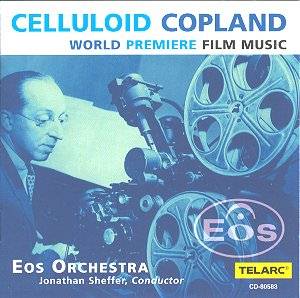![]()
![]()
![]()
![]()
![]()
![]()
![]()
![]()
![]()
![]()
![]()
![]()
![]()
![]()
![]()
![]()
|
|
|
|
|
|
|
|
|
|
|
|
|
|||||||
|
|||||||||
|
|
|
|||||||
| March 2001 Film Music CD Reviews |
Film Music Editor: Ian Lace |
index page/ monthly listings /March01/
| **************************************************************
************************************************************** |
Aaron COPLAND
Celluloid Copland - World Premiere Film Music
Eos Orchestra conducted by Jonathan Sheffer
Telarc CD-80583 [59:24]
Crotchet Amazon UK Amazon US

Film music fans have been long accustomed to great works in that genre being ignored, unrecorded or simply lost. Classic scores by the likes of Newman, Korngold, Rozsa, Waxman, and Herrmann remain unavailable to this day. But how to explain the fact that these four pieces by the composer widely regarded as the dean of American music have been ignored and unrecorded for well over half a century? Thank God, then, for the Library of Congress (which has stored the original manuscript scores) and, most particularly, Jonathan Sheffer and his Eos Orchestra for providing these premier recordings of suites from three Copland film scores -- two documentaries and one feature -- plus a suite of incidental music that was performed as recorded music accompanying a marionette show about pharmaceutical companies at the New York World's Fair in 1939. This last piece, "From Sorcery to Science," was first performed live by Sheffer and the Eos orchestra three years ago, and they've chosen to lead off this recording with what, apparently, is its first commercial recording.
It opens with a heraldic fanfare leading immediately to a percussive statement implying an ancient, oriental mode for 'The Chinese medicine Man.' This is followed by 'The Witches' Cauldron' featuring a soft ostinato in strings as woodwinds pitch in, adding more and more elements to the other-worldly concoctions which the strings eventually bring to a stirring boil. "The Alchemist' follows in soft, mysterioso mood, after which timpani introduce 'African Voodoo,' building slowly at first before forming a vigorous backdrop to woodwinds until the two enter into an orchestral colloquy that's pure Copland. The final two parts consist of 'The Modern Pharmacy' - which enters on a slow, rhythmic march in strings that soon develops into a relentless martial theme -- perhaps the march of progress? This same march continues through the finale, now under the title 'March of the Americas.'
The next suite is titled "The City," and also stems from the '39 World's Fair where it accompanied a documentary of that title, described by film music author Tony Thomas as "a freely flowing impression of contemporary American life." Stately horns open the piece, which flows gently into a descriptive passage for the New England countryside as Copland takes us on a gently ambling tour of what is clearly in the vicinity of Our Town.
A harsher tone colors 'The Steel Mill,' followed by the alarum of 'Fire Engines at Lunch Hour' in which Copland introduces bells and whistles to highlight a musical urgency. (One can almost envision a quick montage of close shots as firemen grab equipment, the fire truck is readied and then races off.) Two somewhat contrasting pieces follow: 'Taxi Jam,' with its swarming strings and jagged winds carrying a portent of trouble developing, and 'Sunday Traffic,' based on a more expansive melody that implies a more leisurely parade. 'The New City,' featuring a jaunty, Coplandesque horn theme, and 'The Children' conclude the suite which, at just under 22 minutes, is the longest of the four. (Copland included two sections from "The City" --'New England Countryside' and 'Sunday Traffic' -- in his "Music for the Movies" concert work three years later.)
Sheffield arranged the nearly 10-minute suite that follows, from the 1945 documentary The Cummington Story, which Copland scored for the U.S. Office of War Information. According to Thomas, the story is set in rural New England - familiar territory to Copland, for sure. Copland's music has the sense of noble portraiture about it, sounding rather akin to his more pastoral works. There appear to be five movements, though none are listed separately. (The core of this piece formed the slow movement of Copland's Clarinet Concerto, written in the early 1950s for Benny Goodman.)
The sole feature film included in this album offers nine cues from The North Star, a wartime (1943) Sam Goldwyn movie lauding the heroic efforts of our allies-against-Germany, the Soviet Union. It's no surprise the film is nearly impossible to find today (even in its re-edited and re-titled form of Armored Attack), and I can't help but wonder if his association with it didn't cause Copland at least a little grief during the post-war McCarthy era in this country. As for the score, Copland found himself in somewhat of a dilemma: Although the characters were supposed to be Russian, they were portrayed by Western actors carrying not a trace of Slavic accent. What to do? The composer wisely chose to limit the 'Russian" sound of his music, for the most part merely suggesting the film's ethnic background. A 5-note, Russian-sounding theme, for instance, opens the main title, but does not linger. It will reappear as 'Song of the Guerrillas' (lyrics by Ira Gershwin!) and in the vigorous action cue 'North Star Battle' before emerging one last time in 'Leaving the Village,' the final cue.
Sheffer and the Eos have brought these "lost" scores to life in crisp, well-rounded performances that bring out Copland's distinctive clarity. And while I'm not familiar with other efforts by this barely 5-year-old orchestra, Celluloid Copland certainly has the feel of being a labor of love.
John Huether

Return to Index
| Reviews
from previous months
You can purchase CDs, tickets and musician's accessories and Save around 22% with these retailers: |
||||||||
|